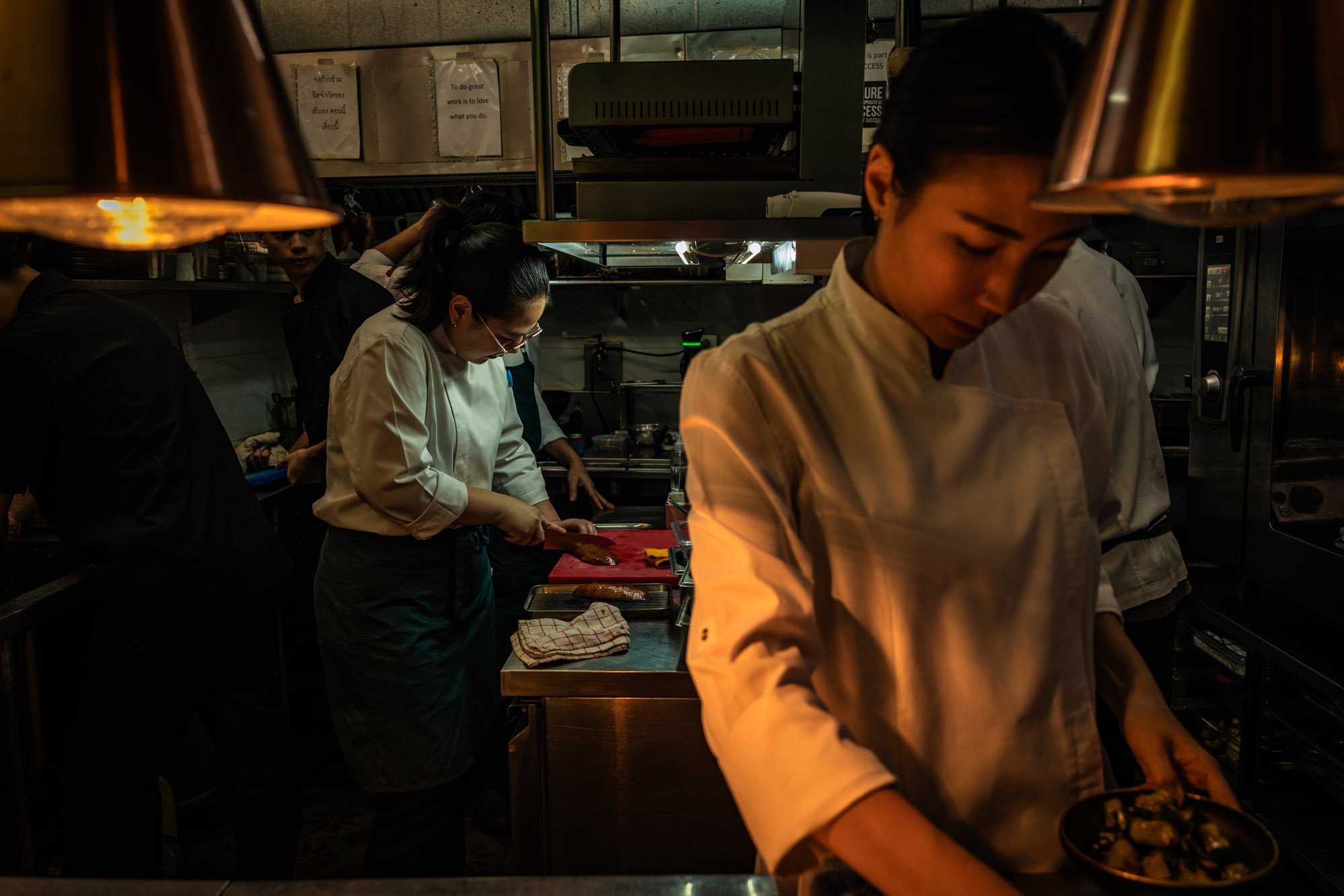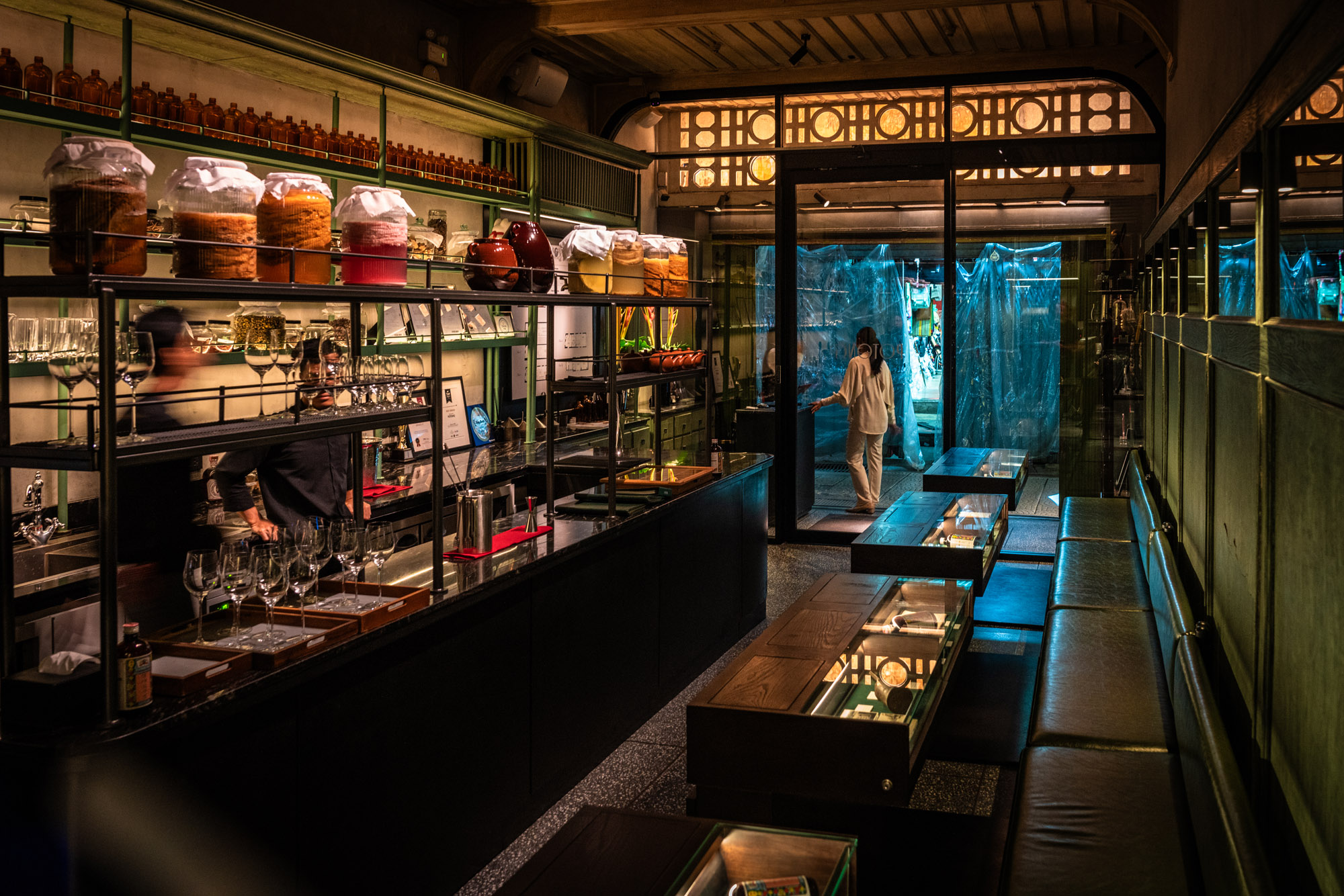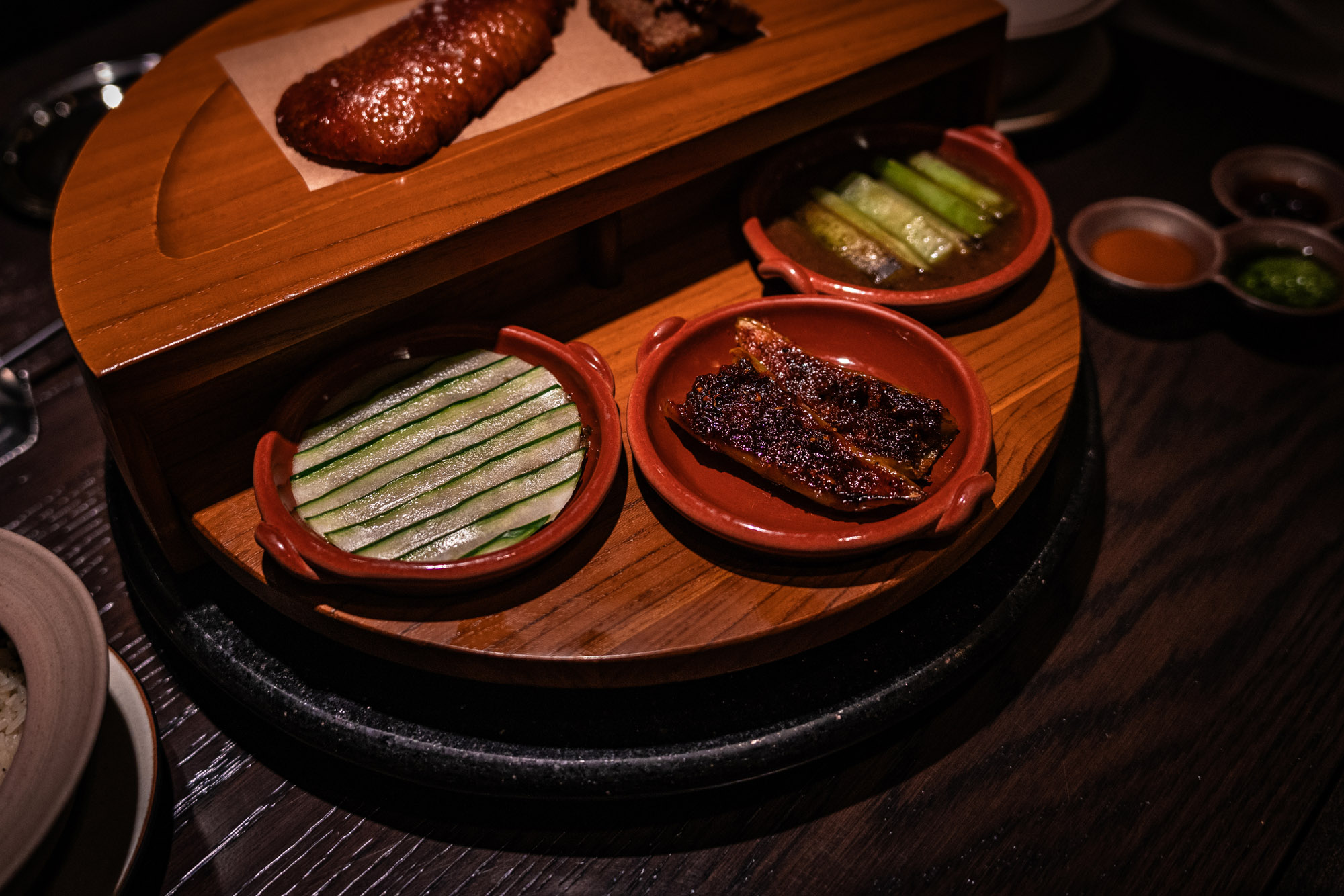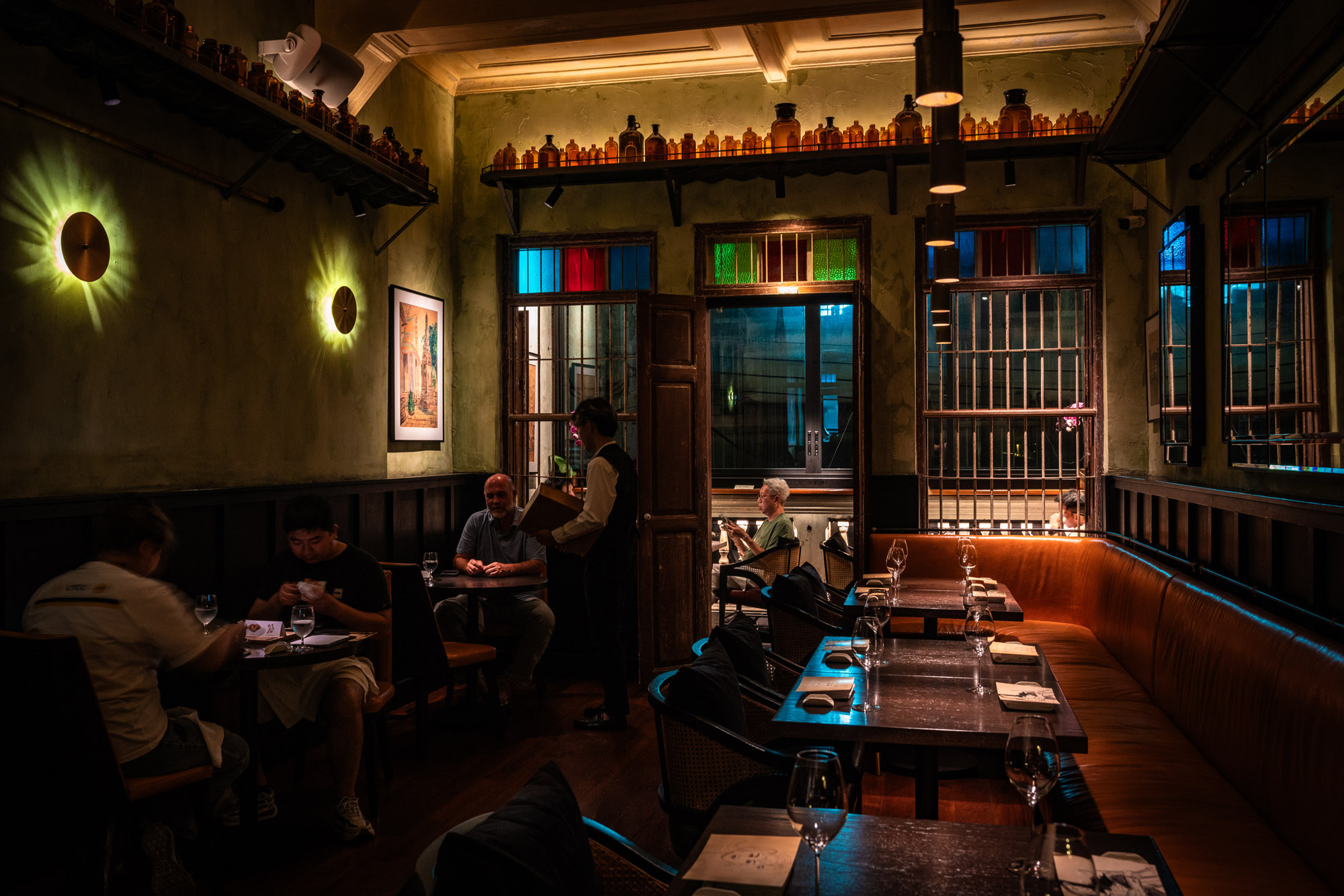Hidden in a narrow dark alley, in the heart of Chinatown of the Thai capital Bangkok, you will find a narrow historic building that once served as a Chinese pharmacy. That building now houses Michelin starred restaurant Potong where chef Pam, voted Asia's best female chef by World 50 Best, rules the kitchen in her own way. Food Inspiration interviewed her in Bangkok.
Almost shyly and with a friendly smile, topchef Pichaya ‘Pam’ Soontornyanakij appears in the lounge area of her five-story restaurant. In addition to being crowned best female chef, she received a Michelin star a year after opening in 2021. By 2024, the restaurant is ranked No. 57 in World’s Best Restaurants and No. 17 in Asia's 50 Best Restaurants. In a personal interview, she speaks fondly of her 4-year-old daughter and is very straightforward when it comes to her work as a chef in a kitchen where women are in the majority. "New employees? I encourage them by letting them run before they can walk. I can give them quite a hard time but that often leads to success."

Team with predominantly women
In the kitchen, Chef Pam stands her ground. "90% of my management team consists of women; my right-hand, sommelier and restaurant manager. The only man in the management team is the bar manager. It’s not a conscious choice per se, but I think female cooks are more likely to choose to apply to a female chef. As a chef, I mainly look at someone's personality. It's important within your team to have people who reinforce each other in terms of communication, discipline, creativity and the will to motivate each other."
Pam studied journalism, but loved to cook. When she won a cooking competition for young chefs when she was 21, she decided to make a job out off her hobby. She left for the world-renowned cooking school, the Culinary Institute of America in New York. There she gained experience as a chef at the Museum of Modern Art in New York and as Executive Chef at Jean Georges** in Manhattan. Back in Bangkok, she opened her restaurant The Table, and became a judge on the television program Top Chef Thailand.
In 2021, she opened Potong. In the narrow building that houses the restaurant, Pam's family have practiced Chinese medicine since 1910. When her grandfather and parents took her there, she fell in love with the building that already bore the name Potong as a pharmacy. “I felt connected to it,” she said. It was clear to her that she wanted to open her restaurant there.

Traveling through Potong
Potong, despite its five floors, seats only 35. During dinner, guests are taken on a journey through the century-old building where original features, such as wooden ceilings and historical details, were restored. On the second floor, where customers used to be received in the pharmacy, guests now receive a welcome drink. Where medicines used to be stored, guests now enjoy dinner. On the rooftop terrace with a beautiful view of Chinatown, cocktails are served after dinner.
Culinary philosophy
Pam integrates her family's stories into the dishes of Thai-Chinese cuisine. Her culinary philosophy revolves around five elements: salt, acid, spices, texture and the Maillard reaction, the chemical reaction between amino acids and reducing sugars that occur when heated. Presentation at the table also plays a big role. For example, guests can choose from a selection of chopsticks, which are not only functional but also have symbolic significance.
The restaurant serves a 20-course tasting menu, combining traditional flavors with modern techniques. Both Thai and Chinese culinary traditions are honored and innovated there. Pam's signature dish is the duck, which is aged for 14 days according to a Chinese technique and praised by culinary experts for its preparation and taste.

Local ingredients
"I prefer local products. 80% of the ingredients we can get from Thailand. I am proud of our collaboration with local suppliers. But some products are simply not available here. For example, we import caviar from China."
"When it comes to creating dishes, I try to close my eyes to everything that comes up on social media and to what I see from colleagues. I want to be unique in my creations, so I focus on our own ability. Cooking techniques I learn from books describing ancient techniques. From those techniques of the past you continue to develop."
Woman in a man's world
When asked how Pam experiences working as a woman in a male-dominated world, she says, "I don't experience it as hard. I don't feel disadvantaged because I am a woman. What I do experience as tough is the combination of motherhood and my career. When I was pregnant, I doubted for a while whether I should focus fully on motherhood, mainly because in our society it is expected of women." In Thailand, however, it is more common for a woman to work in a professional kitchen than in Europe for example. Families tend to be larger there and it is very common to look after each other's children, Pam explains. "You can always fall back on family here. But that doesn't take away from the fact that I would like to have more time with my 4-year-old daughter. A chef's job requires a lot of dedication, including working evenings, so I'm concerned with dividing my time well."

Throwing new employees into the deep end
So what is Pam’s style as a leader in her kitchen? "I am a positive person, energetic and cheerful and strive for perfection. I want to do better every day than the day before. I get happy with people who have the same energy.” What makes her angry? “When people keep making the same mistakes over and over again. Making mistakes is allowed, but not out of convenience. I'm not a chef who yells all the time, but when necessary I do it."
Chef Pam works with a young team. "In the beginning, I like to throw new staff into the deep end a little bit. That's how I motivate my people. I put them in a position with responsibilities, so they find out for themselves how much potential they have. I want to keep challenging my team." Pam likes peace and quiet in the kitchen. "The cooks can talk, but during service I expect full focus. That's when I want it to be all about the dishes. Because only when everything is right with a dish will it stick in a guest's memory." This is her belief: dining happens on a spiritual level - where the cuisine, the wine, the service and the overall ambiance come together perfectly.